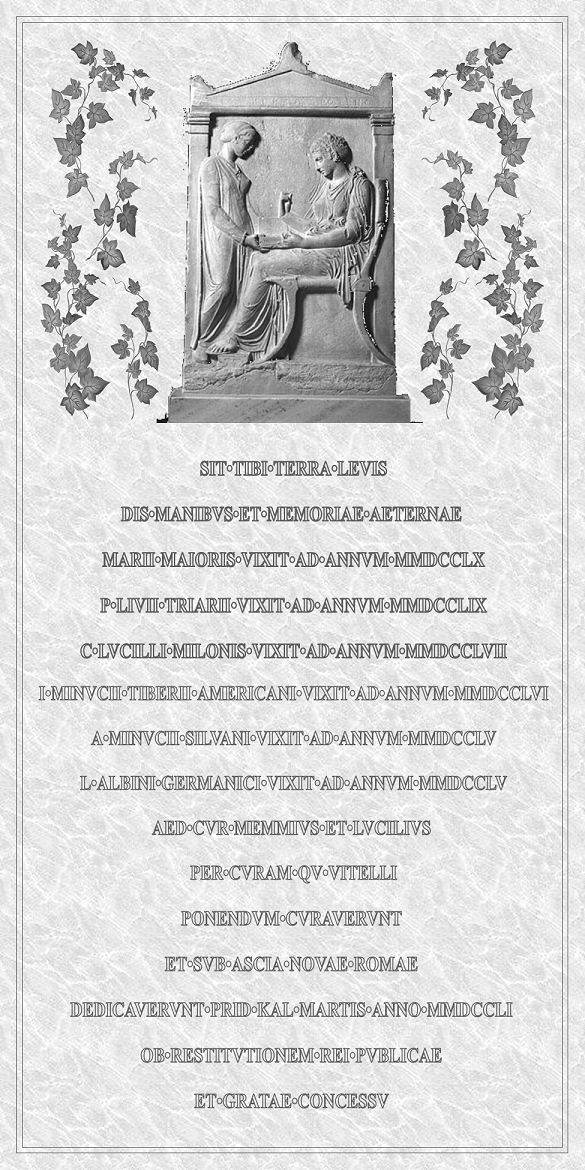Dis Manibus ~ Ludi Conditorum 2761 AUC (Nova Roma)
Polybius on Roman Funerals (History, 6. 53-54)
Now the people of Italy are by nature superior to the Carthaginians and the Africans, both in bodily strength, and in courage. Add to this, that they have among them certain institutions by which the young men are greatly animated to perform acts of bravery. It will be sufficient to mention one of these, as a proof of the attention that is shown by the Roman government, to infuse such a spirit into the citizens as shall lead them to encounter every kind of danger for the sake of obtaining reputation in their country.
When any illustrious person dies, he is carried in procession with the rest of the funeral pomp, to the rostra in the forum; sometimes placed conspicuous in an upright posture; and sometimes, though less frequently, reclined. And while the people are all standing round, his son, if he has left one of sufficient age, and who is then at Rome, or, if otherwise, some person of his kindred, ascends the rostra, and extols the virtues of the deceased, and the great deeds that were performed by him in his life.
By this discourse, which recalls his past actions to remembrance, and places them in open view before all the multitude, not those alone who were sharers in his victories, but even the rest who bore no part in his exploits, are moved to such sympathy of sorrow, that the accident seems rather to be a public misfortune, than a private loss. He is then buried with the usual rites; and afterwards an image, which both in features and complexion expresses an exact resemblance of his face, is set up in the most conspicuous part of the house, inclosed in a shrine of wood. Upon solemn festivals, these images are uncovered, and adorned with the greatest care.
And when any other person of the same family dies, they are carried also in the funeral procession, with a body added to the bust, that the representation may be just, even with regard to size. They are dressed likewise in the habits that belong to the ranks which they severally filled when they were alive. If they were consuls or praetors, in a gown bordered with purple: if censors, in a purple robe: and if they triumphed, or obtained any similar honor, in a vest embroidered with gold. Thus appeared, they are drawn along in chariots preceded by the rods and axes, and other ensigns of their former dignity. And when they arrive at the forum, they are all seated upon chairs of ivory; and there exhibit the noblest objects that can be offered to youthful mind, warmed with the love of virtue and of glory.
For who can behold without emotion the forms of so many illustrious men, thus living, as it were, and breathing together in his presence? Or what spectacle can be conceived more great and striking? The person also that is appointed to harangue, when he has exhausted all the praises of the deceased, turns his discourse to the rest, whose images are before him; and, beginning with the most ancient of them, recounts the fortunes and the exploits of every one in turn. By this method, which renews continually the remembrance of men celebrated for their virtue, the fame of every great and noble action become immortal. And the glory of those, by whose services their country has been benefited, is rendered familiar to the people, and delivered down to future times. But the chief advantage is, that by the hope of obtaining this honorable fame, which is reserved for virtue, the young men are animated to sustain all danger, in the cause of the common safety.
For from hence it has happened, that many among the Romans have voluntarily engaged in single combat, in order to decide the fortune of an entire war. Many also have devoted themselves to inevitable death; some of them in battle, to save the lives of other citizens; and some in time of peace to rescue the whole state from destruction. Others again, who have been invested with the highest dignities have, in defiance of all law and customs, condemned their own sons to die; showing greater regard to the advantage of their country, than to the bonds of nature, and the closest ties of kindred.
Reference: Internet Ancient History Sourcebook
- Return to: Aedilitas curulis MMDCCLXI > Curule Ludi Events Schedule for 2761 AUC > Ludi Conditorum 2761 AUC
Historical Pages > Historical Pages
Master Index > English > Nova Roma > Civic life (Nova Roma) > Events for Romans > Ludi (Nova Roma)
Master Index > English > Nova Roma > Nova Roma History
Master Index > English > Nova Roma > Res publica (Nova Roma) > Magistracies (Nova Roma) > Curule Aediles
Master Index > Maintenance Categories > Pages to be deleted > MMDCCLXI
